_111267322.jpg&action=ProductDetail)
Mr. Pixton lived all his life at High Lane, and for the most part he was employed on the Lyme estate. He then kept the Grocer's shop in Windlehurst Road, High Lane. He was born in 1894 and died in 1973 aged 79.
Male voice: I suppose I should begin with early memories. My forebears on father’s side came from Runcorn, Cheshire. They had a fleet of canal barges, Bridgewater Canal,(below) and settled on the Farm, Withington Hill. Mention of Buttercup and Owlclough Meadows is in the Deeds belonging to this property belonging to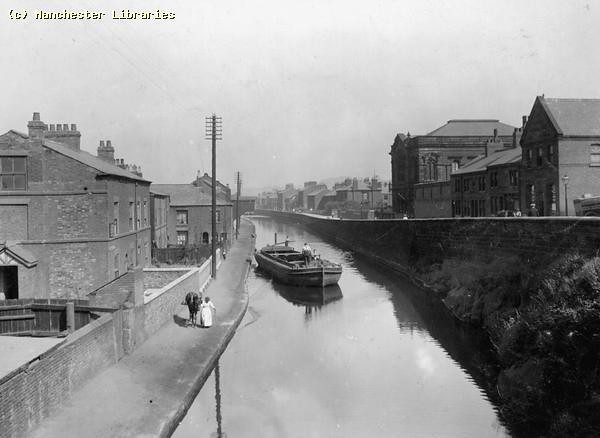 my great great grandfather. I own a property, by the way, lies in Marple Church yard opposite the old church door. The villagers in this area either went to worship Marple or Disley. Now the first incident I vividly remember is showing my finery. When we were children we boys all wore petticoats and were not breeched until we were five. I suppose this particular Sunday I was ready, all dressed up. I slipped out through the back gate across the Buxton Road to show a crowd of young men my new knickers or drawers as they were called. I collected and pointed out the fine edgings, lace, I supposed and what laughter I caused.The next thing I remember was workmen with a trench through the kitchen and scullery. They were putting town’s water into our house for the first time. Father and family had to carry drinking water from a well near to the Stockport/Buxton north western railway ...... gap .......... and many times they would play about until the factory whistle blew for workers to cease work. Then they filled their buckets with canal water and made for home, late, not reaching the drinking water well.
my great great grandfather. I own a property, by the way, lies in Marple Church yard opposite the old church door. The villagers in this area either went to worship Marple or Disley. Now the first incident I vividly remember is showing my finery. When we were children we boys all wore petticoats and were not breeched until we were five. I suppose this particular Sunday I was ready, all dressed up. I slipped out through the back gate across the Buxton Road to show a crowd of young men my new knickers or drawers as they were called. I collected and pointed out the fine edgings, lace, I supposed and what laughter I caused.The next thing I remember was workmen with a trench through the kitchen and scullery. They were putting town’s water into our house for the first time. Father and family had to carry drinking water from a well near to the Stockport/Buxton north western railway ...... gap .......... and many times they would play about until the factory whistle blew for workers to cease work. Then they filled their buckets with canal water and made for home, late, not reaching the drinking water well.
Well, I suppose I must mention the first day at school. I was taken by Sarah Cadman who lived opposite, now Mrs Mills. I rather liked it. After school we played outside on the now A6, underneath street lamps’ paraffin, at marbles, jack and dobbers and many other games which children played until we went to bed after some good homemade broth or porridge. One of the games we were fond of was tormenting householders. You had a very long piece of cotton which you held across the road, behind a wall. Fastened to the far end was another piece of cotton about 6 inches long and at the bottom was a button tied about 6 inches from the window which we pinned it to. You pulled the thread to and from the window, kept gently pulling the cotton and gave over when the housekeeper opened the door. Immediately they got settled inside you began again. They came out again and again but there it was no one about and you repeated the knocking until they found the thread and chased you. That trick was played on cottages right opposite the school at High Lane.
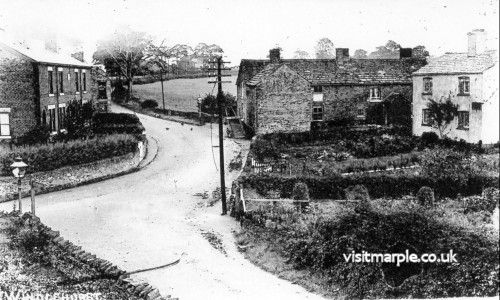 One of my early memories, Ralph & George Arden, farmers at Windlehurst Hall Farm, taking buttermilk and produce to the bakeries and cafes in Manchester. The horses’ hooves did make a clatter on the setts about 3 am every morning and we were so warm in bed. The next event of importance to me was the start of the new Midland Railway tunnel, Hazel Grove to Chinley , the Midland Railway. We were intrigued watching the steam navvies digging great scoopfuls of earth and making the cutting into the tunnel entrance. I would think just before 1900 it was a grand playground for us. The goods yard was just over the top of the tunnel and we used to run on the metals, or lines as they were called, trucks, pushing them uphill and then running down having lovely rides until the night watchman ran us off. Workmen’s huts were spread about the little village. Some of the occupiers were very, very, nice families. About this time I would think three or four hundred children attended High Lane School and many, Sunday School and Church although they had their own (mission) rooms, one on the top of Wybersley.
One of my early memories, Ralph & George Arden, farmers at Windlehurst Hall Farm, taking buttermilk and produce to the bakeries and cafes in Manchester. The horses’ hooves did make a clatter on the setts about 3 am every morning and we were so warm in bed. The next event of importance to me was the start of the new Midland Railway tunnel, Hazel Grove to Chinley , the Midland Railway. We were intrigued watching the steam navvies digging great scoopfuls of earth and making the cutting into the tunnel entrance. I would think just before 1900 it was a grand playground for us. The goods yard was just over the top of the tunnel and we used to run on the metals, or lines as they were called, trucks, pushing them uphill and then running down having lovely rides until the night watchman ran us off. Workmen’s huts were spread about the little village. Some of the occupiers were very, very, nice families. About this time I would think three or four hundred children attended High Lane School and many, Sunday School and Church although they had their own (mission) rooms, one on the top of Wybersley.
Every public house had some attraction in those days, peggy matches, wrestling, boxing, rabbit coursing, pigeon shoots, sparrow shoots, starling shoots of which I did not approve. The village life was gay. You made your own fun plus some social tea parties, conversaziones, boys brigade, night classes, woodwork classes, reading room, gym classes and the reading room, 5 shillings per member, billiards, rifle range etc.
Here I ought to mention mother, one of the best. She came to these parts from Suckley, a village on the Worcestershire/Herefordshire border, farmer’s daughter, one of the best of cooks. Dad was a grand scholar but did not have a chance to push ahead, having a family of three boys and one girl, but we went nothing short because he was such a worker. I might retract here. My great great-grandfather was a stone mason and worked on Lyme Estate. I understand he was one of the hardiest and great workers, would not give up work. One frosty morning, when all the other fellows had gone into the cabin, he would not give up - result, fingers and toes frostbitten. I got this information from men, all turned 80 years in 1908, who knew him as a young man. At one time the nearest shop where we bought flour and tea was Brothers shop, Doodfield, or the corner shop at Disley. We collected the same in a white pillowslip, 14 lbs a turn. The same shop was also known for good cheese and home cured bacon. Later, when the tunnel was being made, we had three butchers’ shops and four small shops. Then the CWS opened, our largest shop building was opposite the lane and small rows of houses were built by local tradesmen. The Roundhouse was taken down, corner of Jacksons Edge Road and Disley Road, which was quite a picture, and replaced by two semis . A Mr Elmsmore was tenant, dad told me. On one of his customary walks, 40 miles one Sunday, Goyt Valley, Burbage, Buxton, Millers Dale, Tideswell, Sparrowpit, home via Chapel-en-le-Frith, called to get refreshments at the Hanging Gate public house, unluckily. He had to push on home and when he reached his gate, the Roundhouse, he remarked, “Never mind the Hanging Gate pub, this Hang’s free!” And in he went. Dad, after tea, made the usual call for him to go to Church and he was asleep on the sofa and would not get up.
At one time the nearest shop where we bought flour and tea was Brothers shop, Doodfield, or the corner shop at Disley. We collected the same in a white pillowslip, 14 lbs a turn. The same shop was also known for good cheese and home cured bacon. Later, when the tunnel was being made, we had three butchers’ shops and four small shops. Then the CWS opened, our largest shop building was opposite the lane and small rows of houses were built by local tradesmen. The Roundhouse was taken down, corner of Jacksons Edge Road and Disley Road, which was quite a picture, and replaced by two semis . A Mr Elmsmore was tenant, dad told me. On one of his customary walks, 40 miles one Sunday, Goyt Valley, Burbage, Buxton, Millers Dale, Tideswell, Sparrowpit, home via Chapel-en-le-Frith, called to get refreshments at the Hanging Gate public house, unluckily. He had to push on home and when he reached his gate, the Roundhouse, he remarked, “Never mind the Hanging Gate pub, this Hang’s free!” And in he went. Dad, after tea, made the usual call for him to go to Church and he was asleep on the sofa and would not get up.
I ought to say, much of the land in High Lane and Norbury belonged to the Lyme Estate which stretched to Bramhall, Torkington, North Strines, New Mills, Whaley Bridge, Kettleshulme, Brinks Farm. The triangle there was the boundary, three estates, Lord Derby’s, Lord Newton’s and Shrigley Estate, Miss Lomas. Back again to High Lane, our small holding was owned by Lord Newton. We had to pay rent at Hazel Grove, Red Lion Inn, where a sumptuous dinner was laid twice a year and whatever drink you wished to have all laid on, £6.00 yearly, all repairs thrown in, paint, wallpaper included. We could keep four cows and young things before they took some of the fields from us to build or make the canal warehouse. Flour was brought by the canal and collected from the warehouse.
 My first work at 12, one week’s employment relieving the boy who was on holiday, Windlehurst Hall, Samuels, the Jewellers, Manchester, 7 am clean the stable, brush and curry comb the pony. Next fill all the coal scuttles, then shown 20 or 30 pairs of boots to clean, breakfast, change into coachman’s rigout, blocker (Block hat) and leggings. Then sat behind, arms folded, to High Lane or Disley Station to bring back the pony and gig. If the lady was going later, left the pony harnessed and repeat, garden till dinner, clean cutlery etc and probably take some of the family to afternoon tea. This included tea for me in the coach house, odd jobs, fed pony, after a brush up, home 7 pm. The wage, which seemed a good one in those days, one florin, two shilling, 7 days. The next work, half time Windlehurst factory, which was a doubling factory, 6 am to 12.30 six mornings half hour breakfast, two and six pence, 36 hours. Afternoons were 1.30 to 5.30, two shillings. The first week I was thruppence in debt. Playing about with the lads whilst brewing tea I, or at least they, broke three jugs, 9 pence each, which I had to make good a week’s work to lose thruppence.
My first work at 12, one week’s employment relieving the boy who was on holiday, Windlehurst Hall, Samuels, the Jewellers, Manchester, 7 am clean the stable, brush and curry comb the pony. Next fill all the coal scuttles, then shown 20 or 30 pairs of boots to clean, breakfast, change into coachman’s rigout, blocker (Block hat) and leggings. Then sat behind, arms folded, to High Lane or Disley Station to bring back the pony and gig. If the lady was going later, left the pony harnessed and repeat, garden till dinner, clean cutlery etc and probably take some of the family to afternoon tea. This included tea for me in the coach house, odd jobs, fed pony, after a brush up, home 7 pm. The wage, which seemed a good one in those days, one florin, two shilling, 7 days. The next work, half time Windlehurst factory, which was a doubling factory, 6 am to 12.30 six mornings half hour breakfast, two and six pence, 36 hours. Afternoons were 1.30 to 5.30, two shillings. The first week I was thruppence in debt. Playing about with the lads whilst brewing tea I, or at least they, broke three jugs, 9 pence each, which I had to make good a week’s work to lose thruppence.
Now I was very interested but I still craved for outside job. I went to be coachman at Lomber Hey (Mr Berry, Solicitor, lived there), 7 am to 6 pm, seven days, eight shillings a fortnight, to be signed for, much of a repeat like the first work at Windlehurst Hall. I stayed for months and then found I could earn 6 shillings a week, back again at Windlehurst factory owned by Pearsons, doublers. Back I went until it blew down February 22nd 1908. Several men, who were whitewashing, crashed through all four floors and were not seriously hurt apart from a few fractured limbs. It looked very pitiful to see our machines hanging down from the fourth floor with the yarn 90’s Egyptian, fine cotton cps.
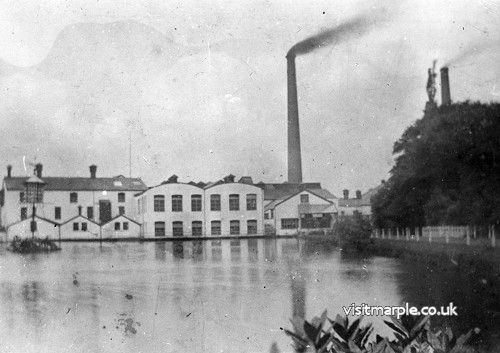 Well, a week later, I know it was Shrove Tuesday, I went to Strines, being out of work, Printworks (left), to find a job. The manager told me to start back-tenting on a printing machine. I told him I had not come prepared, no food, and mother would not know where I was. He replied, “Well you can have the job if you start and on no account can you have it tomorrow.” He arranged for me to go to Mrs Richardson’s, near the old block printing shop, for breakfast and dinner. As I said earlier, lovely meals. Also I had to toss a pancake, why I remember Shrove Tuesday. Now that was a long day, 6.00 pm, worried about mother, no phone to ring like today, 8 shillings weekly. I liked the work, very interesting. We dipped samples of work in the log wood, then a mixture of cow dung and water to fasten the colours provided by Mr Hatherton, the farmer on Disley Road.
Well, a week later, I know it was Shrove Tuesday, I went to Strines, being out of work, Printworks (left), to find a job. The manager told me to start back-tenting on a printing machine. I told him I had not come prepared, no food, and mother would not know where I was. He replied, “Well you can have the job if you start and on no account can you have it tomorrow.” He arranged for me to go to Mrs Richardson’s, near the old block printing shop, for breakfast and dinner. As I said earlier, lovely meals. Also I had to toss a pancake, why I remember Shrove Tuesday. Now that was a long day, 6.00 pm, worried about mother, no phone to ring like today, 8 shillings weekly. I liked the work, very interesting. We dipped samples of work in the log wood, then a mixture of cow dung and water to fasten the colours provided by Mr Hatherton, the farmer on Disley Road.
A pal called to tell me he could get me a job on Lyme Estate, 9 shillings a week. Well, I fancied being outside, animals, birds, etc , by the way, red deer, antelope, fallow deer, Japanese deer, Indian cattle which I was delighted to see. Well, it was very interesting to me. I liked all of it on Lyme Estate really, especially any of the beating and rabbiting. The idea was probably thirty of us, we turned out, some with ferrets. They put them up the rabbits’ hole and we had to coke them. Coke means a muzzle so that they would not stop in the holes. Well, we went ahead, after driving some of the rabbits out, men came along then with bags of hay, put a light to the hay and wafted it up with beaters up holes until you could see it coming out somewhere else. Then men came round with what we used to call “Shiftem,” some kind of a chemical. They put some drops on paper, pushed it up the hole, then followed men with spades, making the holes up lightly. Well, you kept going the whole day through in that fashion. The following day the spades men went over the same ground making the rabbit holes up again, caught up with us and that was the carry-on for that day. Probably it was at least a fortnight ferreting rabbits. We were not able to do it longer because the rabbits would begin going back into the holes after that time. Being scared they were out all the time. Now gamekeepers, or anyone who wished to earn a further two shillings, stayed up watching these rabbits , to keep away the poachers , who, more or less, came from Stockport and their hideout was underneath Middlewood Station waiting for the train to draw in. Then they threw the nets and rabbits into the carriage of the goods van and simply soft- soaped the guard with a couple of rabbits or pheasants if they had been lucky enough. Well, that was the end of the rabbits so far as ferreting and digging them out.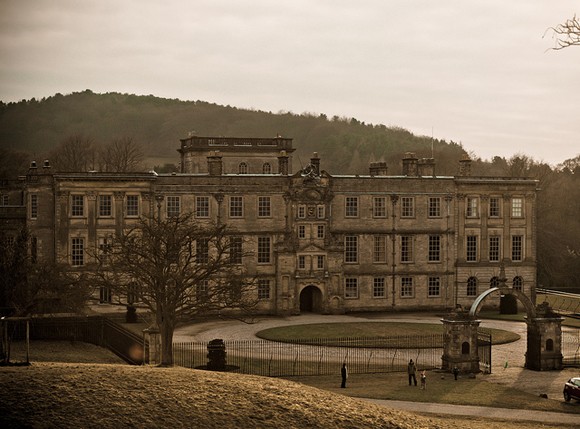
Now came the shoot. All available men lined up across the park, beating, the gun in same line and if a rabbit got up in front, bear in mind they never shot it. It was not sportsmanlike to shoot a rabbit sitting, it had to run at a very good speed. Well, on this one occasion, I well remember, especially years later, Grand Duke Michael of Russia and Prince Henry of Prussia, they were two of the guns. I might say Lord Newton was not much with a gun. He was more on the links, golf. Balfour, so on, Lord Curzon, they were great men on the golf course but he did fall in and took his share of the walk right round the park. Well, of course at the end of the afternoon shoot it was a poor shoot if we had not got 500 rabbits and that was considered a good day’s sport.
Now then, we can take pheasant shooting that was very, very interesting. It was surprising really the number that got shot. Take first field, Pott Shrigley, for instance, that’s a lovely valley Now the men, at least the sportsmen, the guns, were led down the drive and they had loaders either one or two because a quick shooter they had a couple of loaders. Well, beaters went to the far end of the wood, drove the pheasants across this valley and the guns well below were able to have fine shots at these flying birds over their heads. Well, the result was they get on this particular gamekeeper’s beat, Adam Beeley was the name of the gamekeeper, a grand old fella as wise as two ferrets, and they would bag 500 on his shoot alone.
Now then, we can come to duck shooting and this also took months before they were able to achieve a grand shoot. The ducks were reared on the pond, either the millpond, Beeley’s pond or any other pond, head keeper’s pond. They were reared there, hundreds of them, 500 probably or more. Now on the day of the shoot, we’d take Adam Beeley’s beat again. The ducks were gradually led a wee bit away from the pond with his bag of food. He also whistled them, got them fully used to him and they used to follow him a little bit further every morning until he got to the far end of the field, then up through a wood. It was called Knights Low, for some reason or other. These Lows were burial grounds if I remember right and it was a high hill. Gradually over the weeks and months they were fully accustomed to going to the top of the hill. Then at the top of the hill was a wire netting pen and they were gradually induced to go into the wire netting pen several days before the shoot. On the day of the shoot they were made up and men used to watch them for two or three nights, with gallons and gallons of beer and bread and cheese.
On the day of the shoot the sportsmen lined up at the side of the pond and spaced of course so many yards apart. Whoever were in charge of releasing the ducks at the top of the hill to fly back to their pit or pond, released three, four, five or six ducks at a time. Then the sportsmen at the bottom shot them over their heads, some with very good eye. We were able to note who were good shots with the accuracy of shooting. Well, that was the wild duck shooting and they would get four or five hundred . The same thing applied on all the other gamekeepers. Bill Harden was a noted gamekeeper and he used to train his to go to the top of the cage hill, but they had no pen there. It was a matter of trying to scare a few ducks in the air at once and same by the other gamekeepers . They were the only two hills but nobody shot at a sitting duck.
..................Gap ................
Very unique I don’t suppose many people can say a stag has jumped between his legs. Well, I can and now there is only one living who remembers it . We were collecting deer or at least catching deer and we were sending them to Ireland in exchange for some of their bucks. Interbreeding does not do and we used to change several bucks, a dozen probably at a time. Well, we rounded these deer up, beating as we call it, driving them, dogs, men galore, into what was the wild beast shed yard, near the head keeper’s, the kennels on the estate. We first drove them into a big yard; the walls about eight foot high, men left them there, guarding them at night. The following morning, or whenever we wanted to get them ready for the boat, we dressed the horns, cut the antlers off and had a gate into another big pen. Inside the next big pen we had probably four to six nets, about 8 foot high, so that if a stag leapt one. You must remember we were on this occasion after bucks and of course you couldn’t get bucks without does. Well, we tried to separate the does but any doe that went in we tried to get out. Now to keep the stags in we were on an 8 foot wall and, as I said, the nets 4-6 foot, 6-8 foot high. The idea was to drive the stags into the net, then men lie on them, catch them and put them in crates ready to send away whereever we were sending them. Well, the first that came over was a Japanese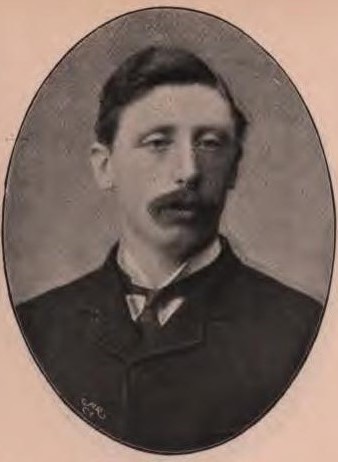 little buck. They were lovely stags, white, big fluffy rumps. That little thing jumped every net and over the 8 foot wall without the least little trouble. The next that came was a red deer, a doe, a nice animal that practically did the same over every net. Now I was standing at a corner, one leg on one wall and a leg on the other wall in a corner. This doe jumped all the nets and jumped right through my legs, between my legs just brushing my leggings. Had it been a buck I would have been knocked on my back from the top of this 8 foot wall and would not probably have been telling this tale, but I can always say a stag has jumped through my legs.
little buck. They were lovely stags, white, big fluffy rumps. That little thing jumped every net and over the 8 foot wall without the least little trouble. The next that came was a red deer, a doe, a nice animal that practically did the same over every net. Now I was standing at a corner, one leg on one wall and a leg on the other wall in a corner. This doe jumped all the nets and jumped right through my legs, between my legs just brushing my leggings. Had it been a buck I would have been knocked on my back from the top of this 8 foot wall and would not probably have been telling this tale, but I can always say a stag has jumped through my legs.
.............. Gap ............
Lyme Hall for a lump of beef. Each workman, according to size of family, had a big lump. I know mine used to come 10 or 12 lb many times. The idea was we went into the servants’ hall , then on into the kitchen where her Ladyship was waiting with Guest of Honour. We placed on the table a cloth and they put on nice clean paper. The shepherd and butcher put on a lump of beef . Then her Ladyship tied two corners of the cloth, handkerchief, what ever you want to call it, the guest beside the Lady , tied the other two and, “ We wish you a Merry Christmas.” Well, Lord Newton (above), his Lordship, and Lord Curzon Derby, they were guests many times. They just stood by along with the estate agent, telling them who were tenants or farmers’ sons or what not. On this occasion I remember one time Lord Newton asked of Mr Lesley, the estate agent, “Who is that man?” “My word it’s one of our tenant’s sons My Lord.” “My word what a guardsman he would make!” I thought differently of course. Well after we had our lump of beef we went for the customary drinks. Bear in mind they had their own brewers there. A man called Shufflebottom , oh he were a grand old fellow. In some of his moods he would tell the men “ya canna go” turn his back, “’ere are ‘eres key, dunna get drowned in vat,” bearing in mind the vats there were huge things. Some of them were brewed for celebrations, 2lst birthdays and so on. Anyhow I don’t think some of the men remembered Christmas Eve.
I might just add this. Lord Newton was very fond of using the axe and as a matter of fact he was the first I saw to use a winch. They had some wonderful lime trees up against the north gate at Lyme Hall. He took the end of a rope; three parts probably of the way up the tree, 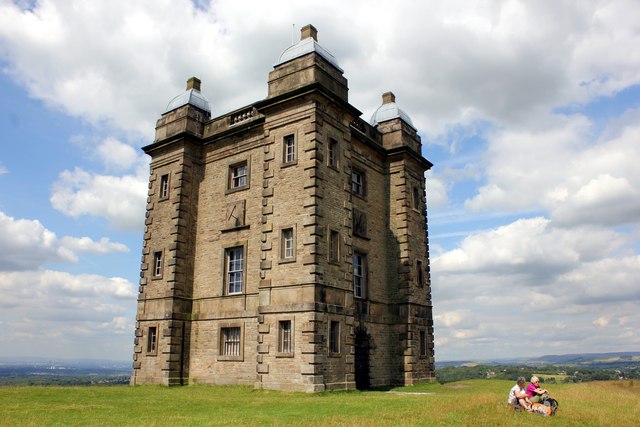 pulled a good hawser to that distance and secured it say three parts of the way up the tree. Then came down and just lever backwards and forwards, backwards and forwards. He pulled that tree over in a very short time. But on this occasion I was going to tell you, I was, he was cutting a tree down in Knights Low, right opposite the south front of Lyme Hall up the Avenue. I don’t think I have mentioned it before but I am also very, very fond of birds and have been all through life. This particular morning, well I never followed footpaths; we were always trespassing, Joe Wells and myself, looking for birds’ nests, not to destroy them but of interest. As I was going along this particular morning, looking for nests, I heard a woodman’s axe. I kept going nearer and nearer till, round the corner, no other than his Lordship, Lord Newton. Well, I think we both looked very surprised in the end, what was the big idea. “Well, my Lord I don’t know whether you would believe me or not but I’ve always been very keen on ornithology and followed bird life all the way through.” Oh, he just carved down on his heels and we talked birds. He asked me if I had ever seen a nightjar. I could of told him I’d found a nest not very far away from here and first one and another he asked me about eggs. I was able to answer him and we were the best of pals before we parted. He told me whenever I was working about the hall I could go and have a look at his library.
pulled a good hawser to that distance and secured it say three parts of the way up the tree. Then came down and just lever backwards and forwards, backwards and forwards. He pulled that tree over in a very short time. But on this occasion I was going to tell you, I was, he was cutting a tree down in Knights Low, right opposite the south front of Lyme Hall up the Avenue. I don’t think I have mentioned it before but I am also very, very fond of birds and have been all through life. This particular morning, well I never followed footpaths; we were always trespassing, Joe Wells and myself, looking for birds’ nests, not to destroy them but of interest. As I was going along this particular morning, looking for nests, I heard a woodman’s axe. I kept going nearer and nearer till, round the corner, no other than his Lordship, Lord Newton. Well, I think we both looked very surprised in the end, what was the big idea. “Well, my Lord I don’t know whether you would believe me or not but I’ve always been very keen on ornithology and followed bird life all the way through.” Oh, he just carved down on his heels and we talked birds. He asked me if I had ever seen a nightjar. I could of told him I’d found a nest not very far away from here and first one and another he asked me about eggs. I was able to answer him and we were the best of pals before we parted. He told me whenever I was working about the hall I could go and have a look at his library.

